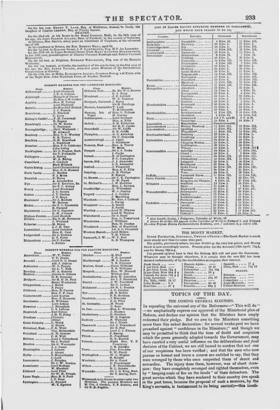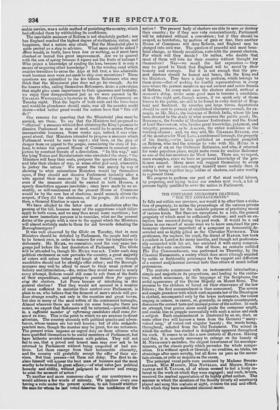TOPICS OF THE DAY.-
THE COMING GENERAL ELECTION.
IN repeating the universal cry of the Reformers—" This will do ". —we emphatically express our approval of the Ministerial plan of Reform, and declare our opinion that the Ministers have amply redeemed their pledge. But we owe to the Ministers something more than this naked declaration : for several weeks past we have preached against" confidence in the Ministers ;" and though we may he permitted to think that the tone of doubt and suspicion which the press generally adopted towards the Government, may have exerted a very useful influence on the deliberations and final decision of the Cabinet, we are still bound to confess that not one of our suspicions has been verified ; and that the men who now pursue so honest and brave a course are entitled to say, that they were wronged by those who once suspected them of deceit and cowardice. The injury done them, however, was of short dura- tion: they have completely revenged and righted themselves, even by" heaping coals of fire on the heads" of their detractors. The great service which they have rendered to their country (we speak in the past tense, because the proposal of such a measure,,by- the King's servants, is tantamount to its being carried)—this inestir mahle service, was a noble method of. punishingthe country, which had offended them by withholding its confidence. The inevitable measure of Reform is not absolutely perfect ; nor has England reached the highest degree of civilization, virtue, and happiness, that a nation may attain. But the Ministerial plan is quite perfect as a step in advance. What more could be asked ? More would, in truth, have been less or nothing, as it must have checked or barred this great improvement. Are we to quarrel with the sun of spring because it ripens not the fruits of autumn ? Who prizes a knowledge of reading the less, because it is only a means of acquiring other knowledge ? Is the winding road which enables travellers to cross the Alps at full trot, a less admirable work because men were not made to skip over mountains ? These questions are submitted to the few bilious Reformers who may think that the Ministerial plan does not go far enough. As for the knaves who, calling themselves Reformers, desire a convulsion that might give some importance to their ignorance and brutality, we enjoy their disappointment just as we were amused by Sir CHARLES WETHERELL'S hysterics in the House of Commons on Tuesday night. That the bigots of both ends and the have-been and would-be plunderers should unite, was all the country could desire—what better proof would the nation have that" this will do ?"
Our reasons for asserting that the Ministerial plan must be carried, are these. To say that the Ministers had proposed so "effectual" a measure without first obtaining the King's promise to dissolve Parliament in case of need, would be to accuse them of inconceivable baseness. Some weeks ago, indeed, it was whis- pered about, that Ministers intended to propose a measure which Parliament would be sure to reject ; and then, on the plea of danger from an appeal to the people, considering the state'of Ire- land, to retain the present House of Commons in constant sub- jection by constant threats of a dissolution. "In this way," said the lying Tories and Revolutionists who circulated the story, "the Ministers will keep their seats, postpone the question of Reform, and take their chance of war, or some other god send, wherewith to jockey the nation." We repeat the tale merely by way of showing to what accusations Ministers would lay themselves open, if they should not dissolve Parliament instantly after a vote against their measure by the House of Commons. But even if the measure should be carried in both Houses, a speedy dissolution appears inevitable ; since laws made by an as- sembly, so self-condemned as the present House of Commons would be by the new law of elections, could scarcely obtain the respect, if they did the obedience, of the people. At all events, then, a General Election is upon us. We have alluded to the latter case of a dissolution after the passing of the bill, because many of the suggestions which follow apply to both cases, and we may thus avoid some repetition ; but our more immediate purpose is to consider, what are the present duties of the people with a view to the appeal which the Ministers will almost certainly make to them for aid towards defeating the Boroughmongers ?
It was well observed by the Globe on Tuesday, that in case Ministers should be defeated by Parliament, the people had only to be honest once, in order to remove for ever the temptations to dishonesty. Mr. HumE, we remember, used the very same lan- guage just before the last dissolution of Parliament. The Globe will be attended to, though Mr. Hume was not. Under such deep political excitement as now pervades the country, a great majority of voters will refuse bribes and laugh at threats, even though candidates should not be afraidito offer either; and the Borough- mongers may well be afraid to resort to their usual system of bribery and intimidation,—for, unless they could succeed in nearly every attempt, Reform would still come to rob them of the fruits of their expenditure, and perhaps to punish them for oppres- sing the electors. Let Peers beware of interfering in this general election! That they would not succeed in a number of cases sufficient to maintain their control over Parliament, is plain to us, who believe that the ferment of men's minds will pro- duce strange results, not only in the counties and great towns. but also in many of the most rotten of the condemned boroughs, Almost wherever there are voters (in some boroughs there are none), we expect that Reformers will be returned,—provided, that is, a sufficient number of reforming candidates shall come for- ward in time. This is the point to which we are anxious to direct attention. The country abounds with political quacks and adven- turers, whose names are too well known ; but of able and.inde- pendent men, though the number may be great, few are notorious. The present crisis imposes an urgent duty on those citizens who have qualified themselves to be useful members of Parliament, but have hitherto avoided interference with politics. They will not fail to see, that a proud and honest man may now ask to be returned to Parliament without being suspected of bad mo- tives. Let them emerge from their honourable obscurity, and the country will gratefully accept the offer of their ser- vices. But time presses—let them not delay. The first to de- clare himself will appear the best man of business and the most worthy t,obe trusted in great affairs ;—of-what value rare political honesty and ability, without judgment to discover and energy to seize the moment of action?
To another and more numerous class of our countrymen we -would address a few words of entreaty. We implore every one having. a Tote under the present system, to ask himself whether the-man4br whom he last voted deserves the confidence of the nation ? The present body of electors are able to save or destroy their country ; for if they now vote conscientiously, Parliament will be reformed without a convulsion ; but if they should be swayed, as heretofore, by motives of gain or fear, then another House of Commons will deny Reform, and England may be plunged into civil war. The question of peaceful and most bene- ficial change, or bloody revolution, rests with the present electors. For which will they decide? Or rather, who doubts that most of them will vote for their country without thought for themselves? Nay—we recall the last expression — they may be proud to think that -England will be saved by their honesty and courage. But it is not enough that the pre- sent electors should be honest and brave, like the King and his Ministers. They have a duty to perform, which belongs to them alone—that of seeking for worthy representatives in every case where the present members are not earnest and active friends of Reform. In every such case the electors should, without a moment's delay, invite some good man to becothe a candidate. Men of the right sort, though scarce, if we speak only of those known to the public, are still to be found in every district of Eng- land and Scotland. By counties and large towns, deputations should be sent to persons of established character ;—such, for ex- ample, as Mr. MILL, the historian of British India, whose life has been devoted to the study of what concerns the public good.; Dr. BIRKBECK, the founder of Mechanics' Institutions and the friend of Lord BROUGHAM, who, besides great knowledge, judgment, and integrity, possesses, as he deserves, the entire confidence of the working-classes ; and, we may add, Mr. CHARLES BULLER, one of the members for West Looe, a condemned borough, the property of his family,—who lately published an excellent pamphlet on Reform, who had the courage to vote with Mr. RIME in a minority of six on the Ordnance Estimates, and who, if returned for some populous place, might make room for another Reformer as one of the last members for West Looe. These are, we repeat, mere examples, since we have no personal knowledge of • the gen- tlemen named. Many more will suggest themselves to every reader ; and no one can employ himself more usefully. than in aiding to bring together large bodies of electors, and men worthy to represent them.- We propose to perform our part of that most useful labour, by preparing, and laying before our readers next week, a list of persons highly qualified to serve the nation in Parliament: •



























 Previous page
Previous page